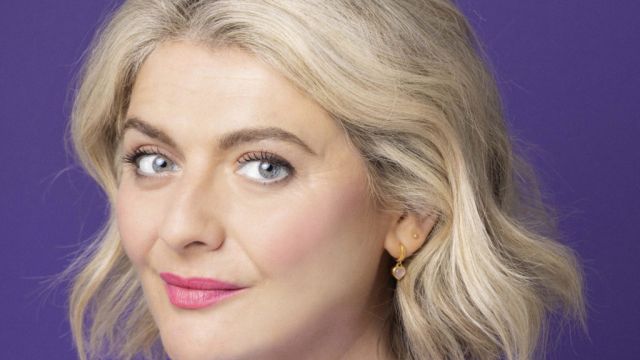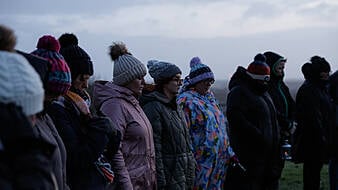In the dead of night, recovering alcoholic, journalist and mental health campaigner Bryony Gordon would sneak down to the kitchen to binge on raw cooking chorizo, beef jerky and bags of crisps, hiding the evidence from her family and waking up with terrible food hangovers.
She had replaced one addiction with another, developing a binge eating disorder which eventually caused her as much pain as her previous alcoholic benders, she recalls.
“I was two-and-a-half years sober [she gave up booze in 2017] when the pandemic hit and I was so relieved [that I wasn’t drinking], as I would have literally killed myself with alcohol in the first lockdown,” she reflects. “I didn’t recognise that I’d fallen headfirst into this other addiction.”
View this post on Instagram
Advertisement
The binge eating disorder, which lasted just under a year, escalated into her raiding the kitchen bin for scraps from dinner, she recalls, out of sight of her husband, financial journalist Harry Wilson, and daughter Edie, then seven.
She charts the episode and other changes in her life in her latest book, Mad Woman, a follow-up to her bestselling Mad Girl, published in 2016, which focused on living with mental illness.
Today, the columnist, who over the years has suffered from depression, OCD, bulimia and drug dependency, says: “Recovering from an eating disorder is, weirdly, far harder than recovering from alcoholism.
“None of us essentially need alcohol to live, but we do need food,” she continues. “You can abstain from alcohol, you can cut it out, whereas with food you have to eat three times a day. There’s a great phrase which a lot of eating disorder experts use, which is, ‘Eating is like having to take a tiger out for a walk three times a day’. I certainly found that.”
The new addiction crept up on her, she recalls. “In the second lockdown, I really became aware that I was stuck in this habit that felt similar to the last days of my drinking.”
It wasn’t about weight, she says. “It was about numbing myself with food. It wasn’t about what I weighed. I knew that if I was going to recover from this, it had to be about nourishing myself and looking after myself, and not about wanting to recover from binge eating disorder because I need to lose weight. It had to come from a place of love for myself.”
She found a therapist who specialised in eating disorders. To wean herself off the binge eating cycle, she had to plan to make sure she didn’t get hungry, and that she ate dinner with her daughter at 5.30pm. She also re-educated herself to think that no food is ‘bad’.
Gordon spoke about it on social media, and had flurries of messages from people with similar experiences.
“People don’t recognise it as an eating disorder, they think it’s just slovenliness, they think it’s a failure on their part as humans, but it’s not – it is a clinical thing.”
Cross addiction is very common, she adds. “It’s like whack-a-mole. I got sober from alcohol and drugs two-and-a-half years earlier, and then suddenly another thing pops up.”
The columnist has long been banging the drum for body positivity and raising awareness of mental health issues, as the founder of Mental Health Mates, an initiative where people can connect through 150 UK walks.
She has run the London Marathon twice – once in her underwear – and in 2022, she ran 10 x 10km runs in 10 days to raise awareness of mental health and positive body image.
In April, she’ll run the Brighton Marathon, and then run the 70 miles from Brighton to London over two weeks, followed by the London Marathon, raising funds for Mental Health Mates and highlighting how exercise is for everyone.
View this post on Instagram
“A lot has happened in the last 10 years and my views on mental health changed a lot,” she explains, not always with a ‘happy ever after’ scenario. She’s now 43 and has grappled with early menopause, hormonal imbalances that sent her spiralling downwards, and several health scares.
She thinks she will always be on antidepressants – she’s been on them since she was 17 – because “they are difficult to come off”, sees a therapist and still does 12-steps work. Her hormones explain much about her mental state, she agrees.
“Over lockdown, I had quite an early menopause and it really screwed with my mental health. I was quite stunned. You think you know all about depression, mental illness, OCD, and then something else comes along and reminds you that you don’t.”
She was finally able to see how much her mental health issues had been exacerbated by her hormones and how no one had thought to explore it.
“I probably had PMDD (Premenstrual dysphoric disorder) for the whole of my life, and that has had a bounce back on my inability to know what it was and to think it was a failure of me, instead of knowing it was a hormonal condition.
“It led to all sorts of shame and masking behaviour. My first encounter with OCD was a couple of months before I got my period. I’m probably predisposed to this kind of stuff, but it’s definitely made worse when my hormones are out of whack.”
When she went on HRT – which she still takes – she found she was intolerant to progesterone, a hormone the body naturally produces. She says knowing that her mental health troughs might be hormonal is a relief.
“I was in such self-loathing of myself. I couldn’t comprehend that this might be complex, like a chemical or biological process. We gaslight ourselves because that’s what we are so used to doing.”
It was as a result of a greater spotlight on the menopause, aided by the work done by TV presenter Davina McCall, that Gordon got herself checked out.
“Ten years ago, I would have just thought I was losing my mind. I think about Davina and I think, she did inadvertently save my life. I sent her a message the other day to tell her.”
She says she’s happier now than she’s ever been.
“The stuff with the menopause, or perimenopause or whatever you want to call it, was really hard, but it’s a necessary for me because it was like a wake-up call to deal with this stuff, because I didn’t want to be miserable for the next 40 years. I think of menopause as a big cosmic reset.”
Today, her relationship with food is a world away from her binge eating disorder period. Her fridge houses chicken breasts, milk, cheese and eggs, and the vegetable drawer no longer hides the cooking chorizo she once hoarded. She has taught herself what she calls ‘normal’ eating, away from the all-pervading diet culture.
“The culture is so f***** up. Naturally we just avoid carbs, we’re like, ‘Oh, I shouldn’t have carbs’, but carbohydrates are so important, especially with women going through the menopause. I remember this therapist saying to me, ‘It’s ok for you to have a pizza for dinner, Bryony’.
“I plan [meals] but I like to look forward to it,” she continues. “My attitude towards food has changed quite a lot. It’s about nourishing me, looking after my body, as opposed to punishing myself.”
Mad Woman by Bryony Gordon is published by Headline on February 15th.







